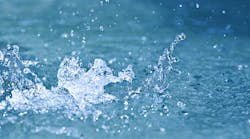By Michael Dimitriou
As the water quality and quantity needs of our society have changed, so have our requirements for energy. Energy is expended in all stages of the water cycle of sourcing, treating, delivering, collecting, waste treatment and discharge or re-use of this life sustaining product. To address the changing needs, suppliers, designers and utility operators are responding with new and innovative solutions in some unusual and non-traditional ways.
Over the past two decades energy usage has become a key concern for utilities as they applied more energy- intensive new technologies to meet more stringent water quality and demand needs. Energy represents a substantial and rising cost to water and wastewater utilities - as much as 40 to 55% of their operating budgets. In a recent industry survey, utility directors rated energy cost as one of their top five concerns.
In drinking water supply, as our water quality challenges have increased due to the shortage of suitable raw water sources, shifting populations and the need to meet improved regulations, our technology has changed to more energy-intensive processes. Ultra- and micro-filtration, UV, ozone, and desalination are all effective and needed technologies now being applied to provide high quality drinking water. However, these new technologies also require significantly more energy than the processes they replace. A UV or ozone system can consume as much as five times the energy of more traditional disinfectants. Sea water desalting can typically require four times more energy than non-brackish surface water treatment methods.
On the wastewater treatment side, we have experienced a shift over the last two decades to decrease energy usage in secondary treatment through the use of fine pore diffused aeration and more advanced activated sludge processes like SBR technology. However, the advent of growing water shortages and new regulations are requiring us to move towards conservation and reuse while also applying improved disinfection methods. UV and ozone technologies are now being widely applied for a variety of design reasons including safety and to limit disinfection byproduct formation. As noted previously, these systems require significantly more energy than traditional chemical based disinfectants.
Reuse of wastewater allows us to use water more wisely, but can result in an additional 20-40% increase in energy use. The industry is experiencing an increasing application of MBR’s, membranes and even reverse osmosis systems to meet our reuse needs.
All of these changes are critical to solving our need for water, but all contribute to a growing dependence on energy. How is our industry responding to the challenge?
First, new and more energy efficient products - There has been a significant increase in the development of lower energy consuming processes by suppliers. This includes: energy recovery systems for high pressure desalination systems, more energy efficient UV technology, new types of low pressure UF and MF membrane products for both reuse and surface water treatment, advanced aeration products that reduce the energy needed for biological treatment and sludge reduction and elimination processes that limit both the quantity and the need for further treatment.
Second, holistic energy management - Utility managers are more widely embracing the concept of Total Energy Management. They and their design consultants understand the fundamental need to focus on a combination of both treatment and transport in managing energy needs. To meet this broader approach to operation, suppliers are introducing more advanced SCADA-based combined transport and treatment management systems. These are complete system-wide energy managing processes. The automation technology is demand- and constraint-based and applies advanced monitoring and controls to operate the total water system in an energy-saving manner. Such systems limit pump starts and stops by monitoring and controlling both treatment and transport. Pumping, treatment and storage are monitored and paced to meet real-time demand while optimizing energy usage to both demand and energy rate periods.
Third, funding substantial R&D efforts to develop new technologies that are less energy dependent - Researchers are now working on new membrane materials that can desalt at 2 to 5 times lower pressures, new methods of generating UV at 50% of the energy we currently use, real time monitoring of influent water quality to allow for instantaneous control and optimization of the treatment process, new enhanced energy generating devices that can be used to power lift stations and small treatment facilities, and advanced sensing technology for equipment coupled with advanced system management software that enables optimization of both operation and maintenance.
In the end, the demand for energy-efficient technologies will be met by new and improved products that will go hand-in-hand with new design, management and operational philosophies, and we will continue to meet the water needs of our citizens.
About the author:
Michael Dimitriou is president of Water Innovations, a Richmond, Virginia-based firm dedicated to bringing new and innovative water treatment technologies to the market. He is former chairman of WWEMA’s Drinking Water Regulatory Committee.


